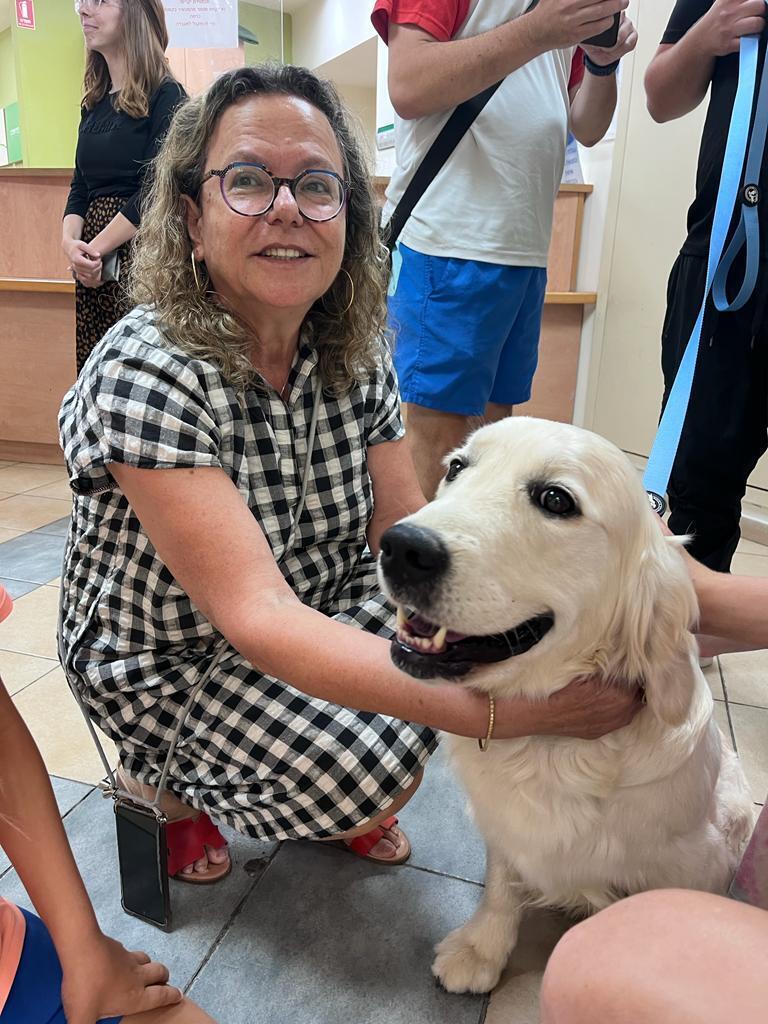Getting your Trinity Audio player ready...
"We worked with a child diagnosed with an autism spectrum disorder. He struggles with verbal communication, and it's challenging for him to express himself. However, when a dog enters the room, it instantly changes the atmosphere, which, in turn, eases his anxiety. He even approaches the dog and feeds it. The change in his anxiety levels during his doctor's appointments is noticeable," shares Dr. Miriam Fink-Lavi, a regional psychiatrist in Jerusalem. She's leading a unique initiative, the first of its kind in the "National Service Dog" health fund.
Read more:
This initiative, carried out in collaboration with "Ofer - Centers for Therapeutic Dog Training", involves having dogs in waiting rooms and treatment rooms at the clinic. These dogs provide company to children and adults during their visits, helping to relieve the anxiety that often comes with waiting or receiving treatment.
"As a child and adolescent psychiatrist, I've observed an increasing demand for mental health services throughout my career. This increase is due to various factors such as the impact of the coronavirus, war, and a rise in mental health awareness and stigma reduction," explains Dr. Fink-Lavi. "Today, there's a broad consensus in Israel on the importance of mental health. However, we notice a significant gap in the mental health services available to children, adolescents, adults, and elderly individuals who are in real distress, versus the ability of public mental health services to provide the empathetic and personalized care they need."
In a bid to expand therapeutic options, Dr. Fink-Lavi, along with other partners, launched this new initiative. She states, "We sought to find accessible and precise methods that could benefit a large population. Some individuals find it challenging to engage in psychotherapeutic treatment or express their feelings. Such individuals are in search of alternative methods that can help improve their mental wellbeing and facilitate their journey to mental recovery, even in extremely difficult circumstances."
According to her, the use of therapy dogs and service dogs in public mental health services has seen significant growth in recent times. Many psychiatric units have already included a therapy dog as a part of their treatment plan. Moreover, therapy dogs are being utilized in diverse therapeutic environments to help reduce stress, anxiety, pain, and feelings of loneliness.
"We've observed that dogs, whether they're used for emotional support or as companions for individuals dealing with crises, trauma, post-traumatic stress, or depression, have numerous benefits," she explains. "People who have dogs at home possess a certain resilience that can help them alleviate feelings of loneliness, depression, and anxiety.
"This is particularly true for individuals who are grappling with complex post-traumatic stress, such as that resulting from warfare or a terrorist incident. A dog can be a pathway to the patient's heart: it eliminates obstacles and facilitates emotional connection and treatment from the very first interaction. Studies have shown that the presence of a pet, or even merely thinking about it, can lead to a decrease in cardiovascular measures, including blood pressure and heart rate."
Canine support extends beyond the patients
The service works on two primary fronts. "Firstly, we've introduced a dog named Cookie into the clinic. Cookie visits the clinic regularly and is considered part of the team. This allows a child or adult who comes for psychiatric treatment to see her and establish a connection," Fink-Lavi explains. "She helps to alleviate anxiety, breaks the ice, and offers a source of emotional and empathetic comfort. It's a creative and unexpected element that often brings a smile to people's faces. Research indicates this also helps reduce staff burnout. Cookie's interactions with the team bring smiles and provide relief during particularly intense and challenging times."
Secondly, the program provides a traditional service of therapy through dogs, also known as therapeutic dog therapy. "In instances where we recognize that an indirect bond with a dog can be beneficial—for instance, in cases of post-traumatic anxiety, communication disorders, autism, or issues related to social connections and self-image—we offer this service. It's slightly different from conventional therapy, which typically involves conversations. This can be used as a tool for both individual and group therapy sessions," Fink-Lavi elaborates.
"There are many adults and children who harbor a fear of dogs, but suddenly they find themselves with an opportunity to interact with a therapy dog whose demeanor is non-threatening and even friendly. In just one meeting, we can often reduce this fear of dogs, leading to a realization from the individual saying 'wait, I can actually do this'. Another instance involves a young girl grappling with an eating disorder and feelings of loss who struggles to open up and share her feelings. However, when the therapy dog is present in the room, she becomes more willing to share, leading to significant progress in her therapy."
So, what does the future hold? Dr. Fink-Lavi states this program is a component of a broader trend aimed at finding innovative solutions to handle the rising demand for mental health services.
"Our objective is essentially to alter or broaden the approach to mental health services. We're not just passively using existing resources, but actively engaging with patients and therapists to identify where we can offer a more compassionate service. We're exploring how we can introduce innovative methods that provide more breathing space: for example, how we can prevent depression before it takes hold or equip populations with the tools they need to prevent post-traumatic stress. This is an additional type of service that will become part of the suite of services we offer, allowing our system to expand and provide a more comprehensive response. We recognize the significant need within the population for this kind of approach."




